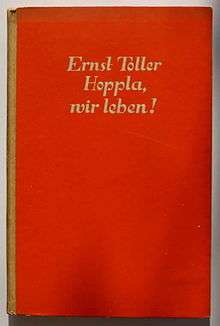Hoppla, We're Alive!
Hoppla, We're Alive! (German: Hoppla, wir leben!) is a Neue Sachlichkeit (or "New Objectivity") play by the German playwright Ernst Toller. Its second production, directed by the seminal epic theatre director Erwin Piscator in 1927, was a milestone in the history of theatre.[1] The British playwright Mark Ravenhill based his Some Explicit Polaroids (1999) on Toller's play.[2]

| Hoppla, We're Alive! | |
|---|---|
| Written by | Ernst Toller |
| Date premiered | 1 September 1927 |
| Original language | German |
| Genre | New Objectivity |
Characters
Prologue
Time: 1919
| Karl Thomas | Eva Berg | Wilhelm Kilman |
| Albert Kroll | Frau Meller | Warder Randrow |
| Lieutenant Baron Friedrich | Soldiers | |
Main play
This piece takes place in many countries, eight years after the crushing of a people's uprising. Time: 1927
| Karl Thomas | Eva Berg | Wilhelm Kilman |
| Frau Kilman | Lotte Kilman | Rand |
| Professor Lundin | Albert Kroll | Frau Meller |
| Rand | Professor Lundin | Fritz |
| Grete | Count Lande | Minister of War |
| Banker | Banker's Son | Pickel |
| Baron Friedrich | Ministry Official | Madhouse Orderly |
| Student | 1st Worker | 2nd Worker |
| 3rd Worker | 4th Worker | 5th Worker |
| Examining Magistrate | Head Waiter | Porter |
| Radio Operator | Busboy | Police Chief |
| 1st Policeman | 2nd Policeman | 3rd Policeman |
| Chairman of the Union of Intellectual Brain Workers | Philosopher X | Poet Y |
| Critic Z | Election officer | 2nd Election Officer |
| 1st Electioneer | 2nd Electioneer | 3rd Electioneer |
| Voter | Old Woman | Prisoner N |
| Journalist | Ladies, Gentlemen | People |
Reception
According to theatre critic Eric Bentley’s book The Playwright as Thinker, when Erwin Piscator directed the premiere of Hoppla, We’re Alive! in 1927 and Frau Meller, the mother in the play, said "There’s only one thing to do: either hang one’s self [sic] or change the world," the youthful audience burst spontaneously into the Internationale.[3]
Hoppla, We're Alive! was one of the books burned in the infamous Nazi book burning, along with 20,000 other left-wing and Jewish books.
References
- Pearlman (2000, 17).
- Pearlman (2000, 31).
- Bentley (1987).
Sources
- Bentley, Eric. 1987. The Playwright as Thinker: A Study of Drama in Modern Times. Revised ed. San Diego: Harcourt, Brace, Jovanovich. ISBN 0-15-672041-8.
- Pearlman, Alan Raphael, ed. and trans. 2000. Plays One: Transformation, Masses Man, Hoppla, We're Alive!. By Ernst Toller. Absolute Classics ser. London: Oberon. ISBN 1-84002-195-0.
External links
- There are some Toller-Texts on the Internet. Links of Helmut Schulze.
- http://www.dhm.de/lemo/html/biografien/TollerErnst/index.html
- Links
- Eamonn Fitzgerald's Rainy Day: Prague spring
- Ernst Toller at Find a Grave
- "The Tartan Online (Carnegie Mellon's Student Newspaper) Political theater: Robert Myers evaluates politics in playwrighting"
- Ernst Toller Page Daily Bleed's Anarchist Encyclopedia